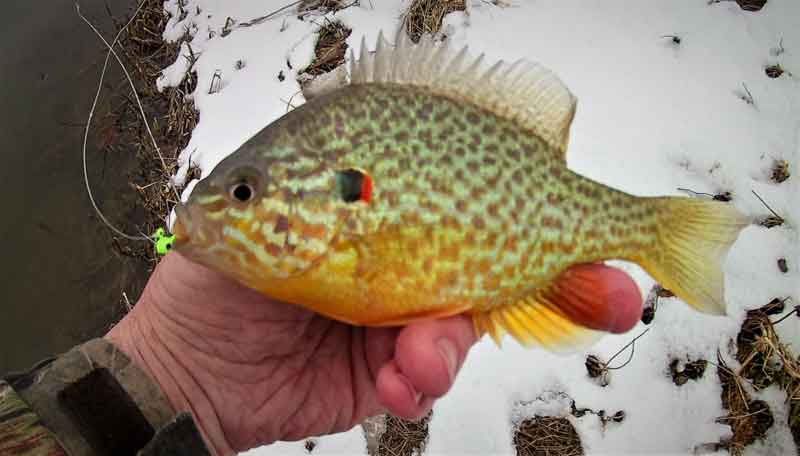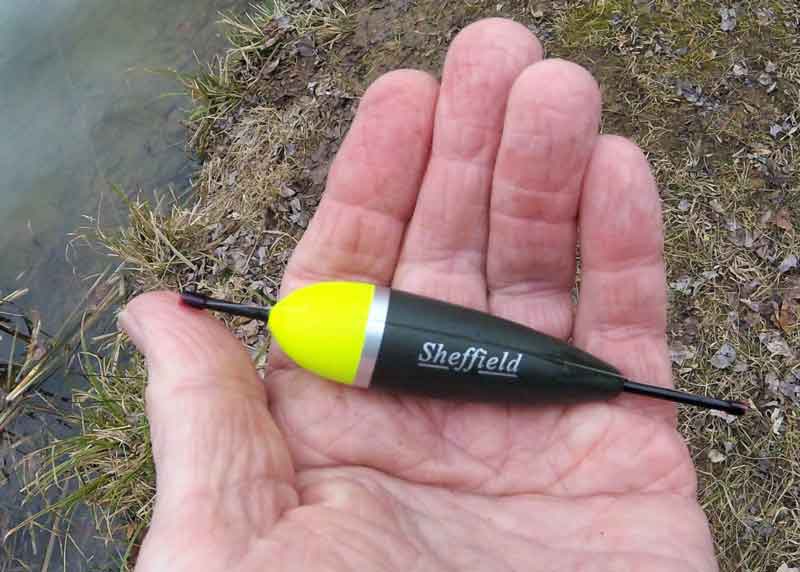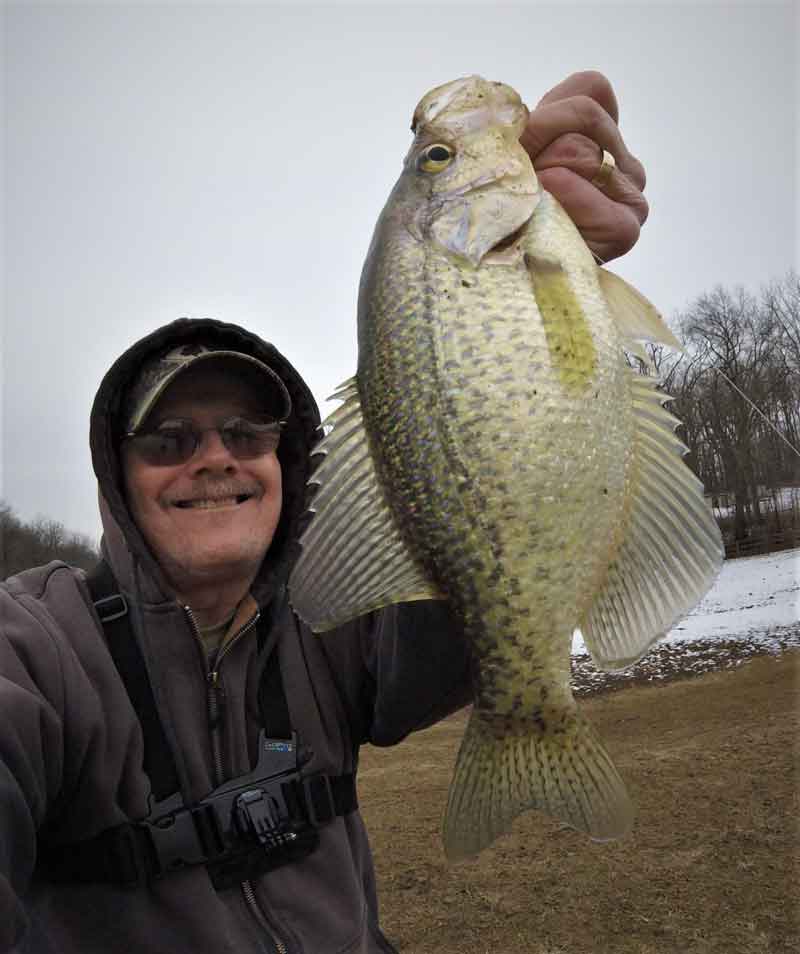With only a very narrow window of 48-hours of safe ice fishing conditions last winter, I still somehow managed to dodge this snow event and that cold spell to put a pretty good hurtin’ on bass, crappies, and bluegill. Although I am a catch-and-release angler for even panfish species, I did succumb to the temptation of keeping of a couple dozen bluegills and crappies over the winter to help fortify the meals when my son and his girls came over for a fish fry. Not that they eat like football players, but you never want to run out of fillets when the main course is fish.

When the season doesn’t allow for ice fishing, open-water mid-winter shoreline fishing throughout the much of the Mid-Atlantic is not an easy gig by any means. The water is cold, usually 35 to 38 degrees, though it may be warmer during mild spells. Skim-ice often forms overnight and can be melted off by noon or a little later the next day. Frequent snowfall and melt-off makes footing slippery and drops water temperatures, even when it’s warming up. Cold winds sting and burn.
But then there’s the fish… bluegills, crappies, bass, and a few other species still willing to bite in the cold. Tip: Over on the Eastern Shore, where winters are milder, freshwater gamesters mix it up all during the chill as water temperatures can be as much as 10 degrees higher than they are on the Western shore. (See Eastern Shore Millponds: Fantastic Freshwater Fishing, to get the scoop on some options). Locally, however, it’s colder. Fish are lethargic, even zombie-like, as they slowly cruise for a winter morsel on weed edges, shallow bays and coves or suspend somewhere in the water column. The “swimming dead” aren’t energetic, but they will feed, slowly and surely, and just barely tip a sensitive float enough to let one know something is actually biting your bait. If your watery, stinging eyes can focus on the float, you may have time enough to set the hook – provided you don’t have a huge bow in your line from a gusty wind, that is.
Remember, small, sensitive pencil-style floats give a better indication of a strike than those that are round. A nice chop on the waters’ surface, from say a 10-mph breeze, keeps the baits bouncing along at a nice pace and helps you cover the water better. Dead calm days aren’t terrible, but a nice breeze can push plankton, baitfish and panfish into windward sun-warmed coves and banks. And nearly-invisible thread-like two-pound test line is better than four-pound string for getting strikes, but watch out for that brush pile over there. Also, short casts can be better than long ones; long distance casts make it difficult to see those slight movements that say, “I’m biting, set the hook”.

Then, there are some “good” problems. The best good problem is having a cold, wet hand from unhooking multiple fish in short order. When you do find fish and start catching some, they’re usually in tightly packed schools or pods. Cast to the same exact spot 30 times in a row and you can get a strike or a fish on almost every cast, hence the wet hand that never dries or warms up. Yes, this is a good problem. Although welcoming and warm, gloves can get in the way when the fishing gets quick. Rebaiting tiny hooks with cold, shivering fingers can be a challenge, even if you’re not fishing through the ice. Maggots, wax worms, and mealworms, beware!
At other times, a good problem is realizing that you are the only one foolish enough to be out there enjoying this madness we call winter fishing. Plenty of privacy, no competition for prime fishing spots, and the steadfast assurance that you will sleep soundly and deeply, either that night or in nap form upon your arrival home. Yes, you might miss your favorite episode of Raymond, Lone Star Law, or the Sports Center rundown of the day. But it’s worth it. Plus, there’s no bag of ice to buy on the way home because the cold lake water in the bucket or cooler keeps those panfish chilled all the way to your driveway.
As bluegills and crappies mill about in slow motion, you cast tiny, 1/80th ounce jigs tipped with meal worms or wax worms and watch those delicate, sensitive floats for any indication of a take. At best, your float will tip to a 45-degree angle, indicating that something has your bait. A quick hookset with a long, ultralight rod puts the hook into an eight-inch bluegill or maybe a foot-long crappie. Feeling justified, you toss the ice-cold, squirming panfish into the confines of your trusty five-gallon bucket, promising yourself that you’re only going to keep enough for one or two meals. The next several cast yield similar results, and before you know it, you aren’t quite sure how many fish have hit the pale. Ten, maybe? Is that enough? That’s when your ice-cold hand cries “stop, STOP already!”.
But you know the game, as you fall head-first and get completely engulfed in the frenzy that yields fish after fish, some of them good ones, some of them dinks. It’s difficult to even re-bait your hook as cold winds and wet hands don’t mix too well. But you know you won’t get nearly as many strikes on a plain jig, at least not now, during the coldest stages of the winter. So, you bait up, toss out and tract your float ‘til it tilts, set the hook again and squeal quietly inside as the frigid hand gallantly struggles to hold yet another fat bluegill that may, or may not, make it to the pan. Admiring the robust fish, you decide to let it be “his” day… his lucky day, as you gently toss him back into the dark water he calls home.

As the afternoon wears on you may realize that you actually had a better outing than most of your warm water efforts. There’s a dozen nice fish in the bucket and you released several that were larger in hopes that they would one day grow to trophy proportions, provided they aren’t caught and consumed by another angler who’s hungrier than you. The sun is setting in the western distance and the bite is slowing down. One last cast, one more fish. One more shot at the swimming dead, the zombies. The addiction of watching bobbers dance and disappear are powerful, but we must make a choice to refrain.
On the way home you think about how good those ice-cold fillets are going to taste, all golden brown and sizzlin’ in the pan of hot oil. Mashed potatoes, corn bread, a little Old Bay on the fish. Ice-tea, maybe a beer. Maybe a nap. It was a good time and a reward for the effort. You think about spring, but deep down you know you’ll likely, once again, go fishing for the zombie fish in the dead of winter.
-By Jim Gronaw